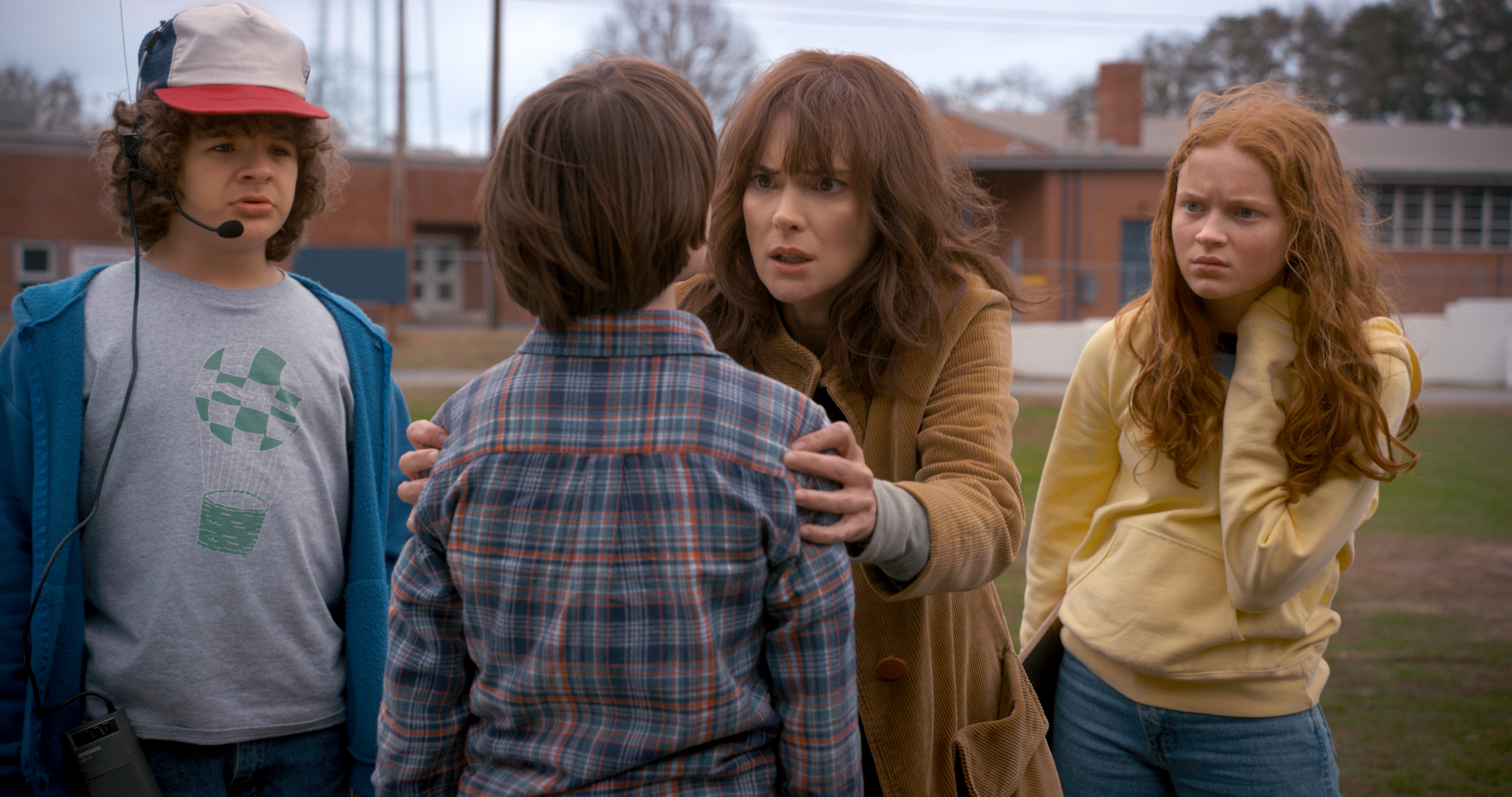The refreshing heroes of Stranger Things 2
Enough with antiheroes! These are protagonists we can really believe in.


A free daily email with the biggest news stories of the day – and the best features from TheWeek.com
You are now subscribed
Your newsletter sign-up was successful
We live in an age of antiheroes. From House of Cards to The Americans, Deadpool to Suicide Squad, most popular films and television shows are headlined by the controversial, the morally shadowy, and the jaded. We've traded relatively lighthearted shows like Friends and Everybody Loves Raymond for Breaking Bad and The Leftovers. That's not necessarily a bad thing. Dark shows can be great! But it does suggest that a lot of Americans are disillusioned about their world, and looking for characters who reflect their own cynicism.
Thankfully, Stranger Things 2 offers something completely different. (And beware: Spoilers lie ahead.)
In a world of antiheroes, the hit Netflix show, which debuted its second season over the weekend, presents us with an astounding array of big-hearted and virtuous characters, protagonists who put themselves at risk to help the vulnerable.
The Week
Escape your echo chamber. Get the facts behind the news, plus analysis from multiple perspectives.

Sign up for The Week's Free Newsletters
From our morning news briefing to a weekly Good News Newsletter, get the best of The Week delivered directly to your inbox.
From our morning news briefing to a weekly Good News Newsletter, get the best of The Week delivered directly to your inbox.
One hero in Stranger Things 2 is Joyce Byers (Winona Ryder). She is a ferociously loving, protecting mom — one whose past bouts with trauma and danger have made her stronger and more resilient. In the first season, Joyce felt mentally and physically fragile. This season, there's no such tenuousness about her: Joyce is all steel and spine. About halfway through the season, as Joyce fights off a team of scientists to protect her son, I realized that she is the mom we all aspire to be. She epitomizes the Shakespearean saying that "though she be but little, she is fierce." It's a testament to Ryder's abilities as an actress that Joyce can be all this, and yet still feel messy and real.
Then there's Jim Hopper (David Harbour). Last season, he was an anti-hero: dealing with his own trauma, too drunk or cynical to grasp the immensity of the supernatural problem his town was dealing with. By the end of the first season, Hopper was facing his own fears and regrets, slowly coming into his own. In this season, though he's imperfect, Hopper follows the pattern of a hero: not just via noble deeds, but also through small interactions — like when he apologizes to Eleven (Millie Bobby Brown) for upsetting her, or when he comforts Joyce after she loses Bob. In one scene, he guides a troop of defenseless followers through a building filled with "demogogs" (fledgling demogorgons), all the while carrying an unconscious Will Byers (Noah Schnapp) on his back. This is Hopper at his best.
Season two's most lauded hero will likely be Bob Newby (Sean Astin), Joyce's new boyfriend. He begins as a meek, underwhelming nerd. He ends the season as our protagonists' savior, a character who sacrifices himself for the good of the group. Bob, perhaps more than any other character, is uncomplicatedly good. He is nice to his very core, often bordering on boring or embarrassing. Yet we still love him, and mourn his gruesome end. This is right in Astin's wheelhouse as an actor, akin to the Rudy and Samwise Gamgee characters we've seen him play before. He's the understated hero, the one we overlook until the very end.
But adults aren't the only ones who wear the mantle of heroism. Steve Harrington (Joe Keery) puts himself at risk, time after time, to ensure the safety of the youngsters around him. He comes to Dustin's rescue after he encounters a baby demogorgon, leads a troop of terrified preteens through a life-threatening maze of events, and keeps everyone safe with a swing of his nail-studded baseball bat. He's not the hero we expect — but he's the hero this season needs.
A free daily email with the biggest news stories of the day – and the best features from TheWeek.com
Nancy Wheeler (Natalia Dyer) and Jonathan Byers (Charlie Heaton) are also heroes in their own right. They put themselves in jeopardy to bring justice to Barb, last season's overnight sensation and notorious casualty. Nancy steers herself directly into the dangerous fray, wielding both rifle and hot poker. Jonathan constantly cares for and protects his younger brother, trying to help him find healing from his trauma.
Last but not least, we have Eleven. Millie Bobby Brown gave a stunning performing in Stranger Things last season. She was, much like Hopper, both antihero and hero. This season, we see her struggling with both past and present woes, succumbing to rebellion and resentment, and battling inner demons. But even though she begins the season in turmoil, she progresses to a point of determination and courage — and of love.
Co-creator Matt Duffer told Time's Daniel D'Addario earlier this year that Stranger Things isn't "nasty or mean or condescending or ironic or any of those things, which a lot of content can be right now." He added that "there's just so much of that. And there's a lot of shows about protagonists doing really nasty things to other people."
Aside from some pretty nasty violence and bullies, there's little nastiness about Stranger Things 2. It is dark, sure enough — bleak, even. But its protagonists are sincere, loyal, and courageous in a way we all aspire to be.
We already know Stranger Things is a show about nostalgia. It's an ode to Stephen King and Steven Spielberg, Alien and The Goonies, 80's songs and pop culture. But the show's quality cast of heroes is perhaps the most nostalgic thing about it. It reminds us of the heroic characters we truly looked up to as kids — the Aragorns and Jane Eyres, Spidermans and Nancy Drews. It reminds us of uncomplicated stories of good vs. evil, light vs. darkness, heroism vs. villainy. In a sense, it's deeply comforting. But that doesn't prevent it from also being inspirational. Virtue, when portrayed well, tends to be just that. It doesn't have to be smarmy.
Stranger Things has done an excellent job "handing down" some treasures of the past — reminding us of the glories of a past decade's cinematography, music, apparel, food, and even fonts. It's breathed new life into old tropes and traditions.
But this season, Stranger Things reminds us what heroic characters ought to look like. And honestly, they don't look all that bad.
Gracy Olmstead is a writer and journalist located outside Washington, D.C. She's written for The American Conservative, National Review, The Federalist, and The Washington Times, among others.
-
 The ‘ravenous’ demand for Cornish minerals
The ‘ravenous’ demand for Cornish mineralsUnder the Radar Growing need for critical minerals to power tech has intensified ‘appetite’ for lithium, which could be a ‘huge boon’ for local economy
-
 Why are election experts taking Trump’s midterm threats seriously?
Why are election experts taking Trump’s midterm threats seriously?IN THE SPOTLIGHT As the president muses about polling place deployments and a centralized electoral system aimed at one-party control, lawmakers are taking this administration at its word
-
 ‘Restaurateurs have become millionaires’
‘Restaurateurs have become millionaires’Instant Opinion Opinion, comment and editorials of the day
-
 Walter Isaacson's 'Elon Musk' can 'scarcely contain its subject'
Walter Isaacson's 'Elon Musk' can 'scarcely contain its subject'The latest biography on the elusive tech mogul is causing a stir among critics
-
 Welcome to the new TheWeek.com!
Welcome to the new TheWeek.com!The Explainer Please allow us to reintroduce ourselves
-
 The Oscars finale was a heartless disaster
The Oscars finale was a heartless disasterThe Explainer A calculated attempt at emotional manipulation goes very wrong
-
 Most awkward awards show ever?
Most awkward awards show ever?The Explainer The best, worst, and most shocking moments from a chaotic Golden Globes
-
 The possible silver lining to the Warner Bros. deal
The possible silver lining to the Warner Bros. dealThe Explainer Could what's terrible for theaters be good for creators?
-
 Jeffrey Wright is the new 'narrator voice'
Jeffrey Wright is the new 'narrator voice'The Explainer Move over, Sam Elliott and Morgan Freeman
-
 This week's literary events are the biggest award shows of 2020
This week's literary events are the biggest award shows of 2020feature So long, Oscar. Hello, Booker.
-
 What She Dies Tomorrow can teach us about our unshakable obsession with mortality
What She Dies Tomorrow can teach us about our unshakable obsession with mortalityThe Explainer This film isn't about the pandemic. But it can help viewers confront their fears about death.
